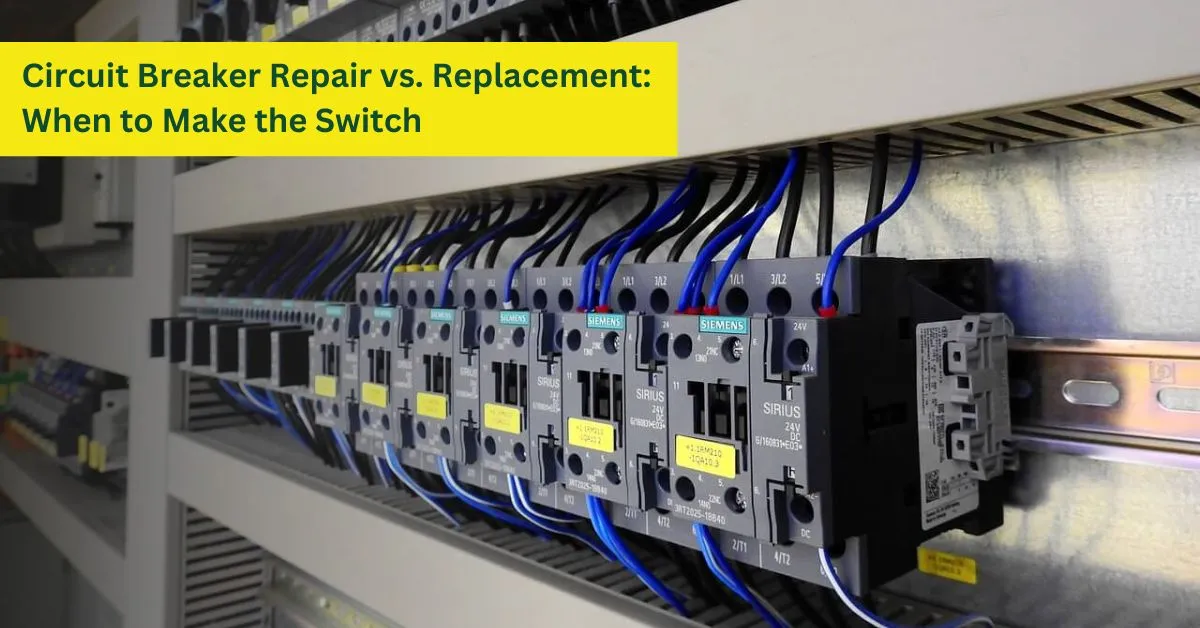
There is no doubt that circuit breakers are important elements of the electrical system in your home that protect your property against short circuits, overloads, and other electrical faults.
These devices may wear out or malfunction over time and leave house owners with a critical decision: should they opt for circuit breaker repair or replace the system? This article will guide you through the factors to consider so that you can make the right decision.
Understanding Circuit Breakers
Before diving into the repair vs. replacement debates, it’s essential to understand what circuit breakers do and how they work. Circuit breakers are safety devices that automatically interrupt electrical flow when a flaw is detected.
According to the National Fire Protection Association, faulty wiring and electrical distribution systems are responsible for an estimated 35,000 home fires each year in the United States.
What are the Signs of a Faulty Circuit Breaker?
Recognizing the signs of a faulty circuit breaker is important. Common indicators include:
- Visible damage or burning
- Frequent tripping
- The circuit breaker won’t reset.
- Strange odors coming from the electrical panel
- Appliances not running at full power
If you notice any of these signs, it’s time to consider whether you should opt for circuit breaker repair or replacement.
Factors You Should Consider
Age of the Circuit Breaker
The age of your circuit breaker is a significant factor in deciding whether to repair or replace it. According to the Consumer Product Safety Commission, the average lifespan of a circuit breaker is about 30 to 40 years. However, this can vary depending on the usage and environmental factors.
- If your circuit breaker is less than 20 years old, repair might be a viable option.
- For circuit breakers over 30 years old, replacement is often the safer and more cost-effective choice.
Safety Concerns
Safety should be your top priority when dealing with electrical systems. The Electrical Safety Foundation International (ESFI) reports that arcing faults are responsible for starting more than 28,000 home fires every year.
If you notice signs of burning, overheating, or other serious damages, replacement is only the one long-term solution.
You should also consider modern circuit breakers with built-in safety features, including fault circuit interrupters to prevent electrical fires.
Cost Comparison
The cost here is another essential factor worth considering. While repair costs are cheaper compared to replacement, frequent repairs may lead you to spend a big chunk of money in the long run.
Energy Efficiency
Newer circuit breakers are more energy-efficient than older models. The U.S. Department of Energy notes that upgrading to several home electronic panels can contribute to overall energy efficiency and cost savings.
Code Compliance
We all know that building codes may involve over time aligning with safety standards. The National Electrical Code is updated every three years. So you must change your circuit breaker; otherwise, it may not meet the current requirements.
If the residential electrical system is outdated, you should contact an electrician to replace the board or you must update the system before selling the property.
When Should You Think About Circuit Breaker Repair?
Repairing the circuit breaker may be the best option if:
- The problem is minor, such as a loose connection.
- The breaker is not more than 20 years old.
- The electrical panel is overall in good condition.
Contact Us!
The decision to repair or replace the circuit breaker depends on various factors, including age, cost, safety concerns, and energy efficiency. While repairs might seem more economical in the short term, replacement often provides better long-term value and safety. Therefore, you should always consult with a licensed electrician before making a decision, as they can provide expert advice based on your specific situation.
Remember, electrical work can be dangerous, and DIY circuit breaker repair or replacement is not recommended. According to the ESFI, electrical injuries account for approximately 4,000 injuries and 300 deaths each year. That’s why you should always prioritize safety and professional expertise when dealing with your home’s electrical system. However, if you want to book our service, contact Boyes Electric quickly.
